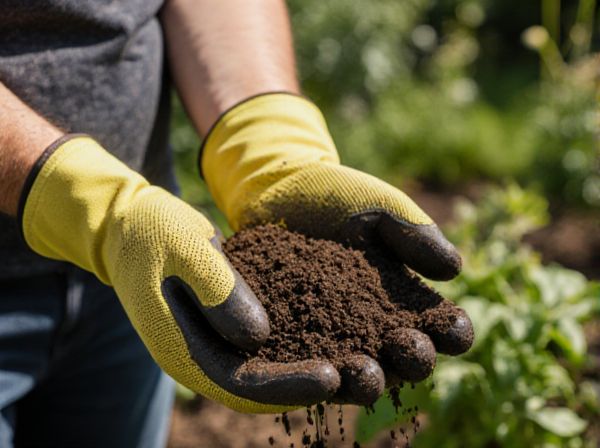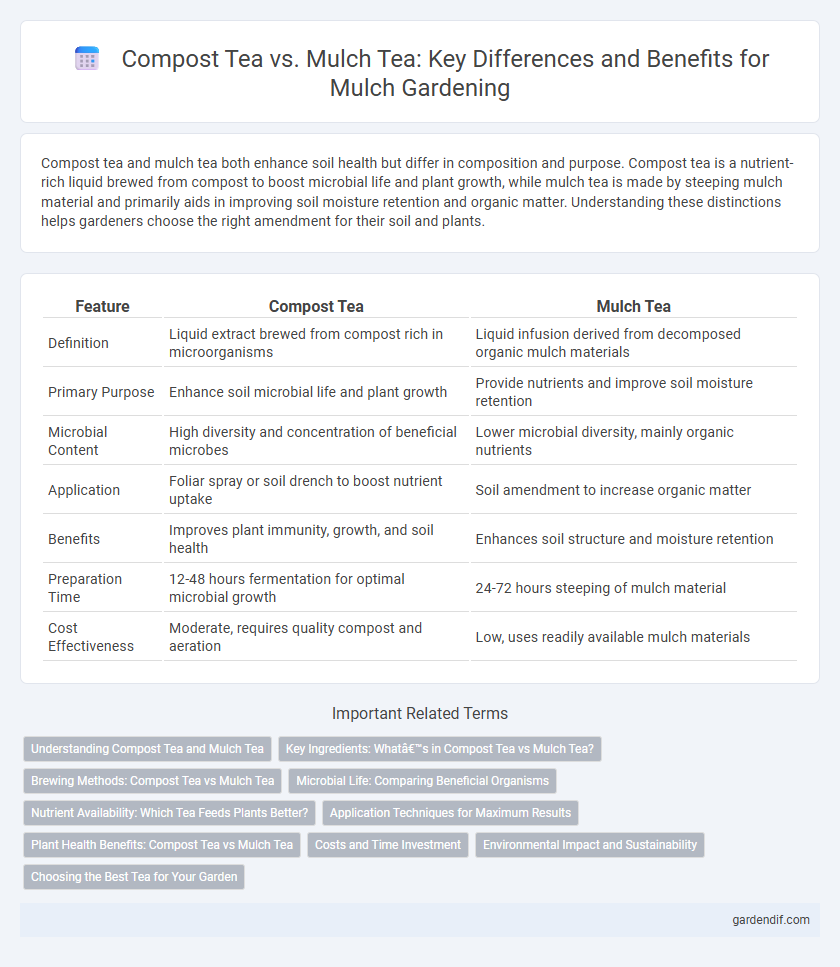
Compost tea vs mulch tea Illustration
Compost tea and mulch tea both enhance soil health but differ in composition and purpose. Compost tea is a nutrient-rich liquid brewed from compost to boost microbial life and plant growth, while mulch tea is made by steeping mulch material and primarily aids in improving soil moisture retention and organic matter. Understanding these distinctions helps gardeners choose the right amendment for their soil and plants.
Table of Comparison
| Feature | Compost Tea | Mulch Tea |
|---|---|---|
| Definition | Liquid extract brewed from compost rich in microorganisms | Liquid infusion derived from decomposed organic mulch materials |
| Primary Purpose | Enhance soil microbial life and plant growth | Provide nutrients and improve soil moisture retention |
| Microbial Content | High diversity and concentration of beneficial microbes | Lower microbial diversity, mainly organic nutrients |
| Application | Foliar spray or soil drench to boost nutrient uptake | Soil amendment to increase organic matter |
| Benefits | Improves plant immunity, growth, and soil health | Enhances soil structure and moisture retention |
| Preparation Time | 12-48 hours fermentation for optimal microbial growth | 24-72 hours steeping of mulch material |
| Cost Effectiveness | Moderate, requires quality compost and aeration | Low, uses readily available mulch materials |
Understanding Compost Tea and Mulch Tea
Compost tea is a liquid extract brewed from compost containing beneficial microorganisms, enzymes, and nutrients that promote soil health and plant growth. Mulch tea, derived from soaking organic mulch materials, delivers soluble nutrients and organic matter that enhance soil moisture retention and microbial activity. Understanding the distinct microbial profiles and nutrient content of compost tea versus mulch tea helps optimize their application for sustainable gardening and improved plant resilience.
Key Ingredients: What’s in Compost Tea vs Mulch Tea?
Compost tea contains key ingredients like microbial-rich compost, water, oxygen, and sometimes added nutrients or sugars to stimulate microbial growth. Mulch tea is brewed from decomposed mulch materials, primarily plant residues and wood chips, which release organic compounds and nutrients but have fewer concentrated microbes compared to compost tea. Both teas enrich soil, but compost tea offers a more potent microbial population essential for soil health and plant growth.
Brewing Methods: Compost Tea vs Mulch Tea
Brewing compost tea involves aerating water enriched with compost to cultivate beneficial microorganisms, typically using an aquarium pump and organic amendments over 24-48 hours. Mulch tea brewing, by contrast, steeps mulch materials in water without aeration, relying on microbial extraction through passive soaking for several days. The aeration process in compost tea enhances microbial diversity and activity more effectively than the static brewing method used in mulch tea.
Microbial Life: Comparing Beneficial Organisms
Compost tea contains a diverse range of beneficial microbes, including bacteria, fungi, and protozoa that enhance soil fertility and plant health by promoting nutrient cycling and disease suppression. Mulch tea, derived from soaked organic mulch materials, tends to have a narrower microbial spectrum, primarily consisting of decomposer organisms that aid in organic matter breakdown but may lack the complex microbial diversity found in compost tea. Comparing microbial life, compost tea offers a richer and more balanced community of beneficial organisms crucial for robust soil ecosystems.
Nutrient Availability: Which Tea Feeds Plants Better?
Compost tea enhances nutrient availability by releasing a complex mix of micronutrients and beneficial microbes that accelerate nutrient uptake in plants, whereas mulch tea primarily provides slow-releasing organic compounds that enrich soil structure over time. The aerobic microbial populations in compost tea promote rapid nutrient absorption, making it more effective for immediate plant growth. Mulch tea supports long-term soil health but generally delivers nutrients less efficiently compared to compost tea.
Application Techniques for Maximum Results
Compost tea and mulch tea differ significantly in application techniques; compost tea is typically diluted and sprayed directly on plant leaves and soil to deliver beneficial microbes quickly, while mulch tea is applied by soaking mulch in water and poured around plant bases to enhance soil nutrition gradually. For maximum results, use aerated compost tea to promote microbial activity and apply mulch tea during watering to improve moisture retention and organic matter breakdown. Timing applications early in the morning or late afternoon optimizes nutrient absorption and minimizes evaporation losses.
Plant Health Benefits: Compost Tea vs Mulch Tea
Compost tea contains a diverse microbial community that enhances soil fertility and promotes robust plant growth by improving nutrient uptake and suppressing pathogens. Mulch tea, derived from decomposed organic mulch, primarily provides soluble nutrients and beneficial microbes that support root development and moisture retention. Both teas boost plant health, but compost tea offers more targeted disease resistance and microbial diversity compared to the nutrient-focused benefits of mulch tea.
Costs and Time Investment
Compost tea typically requires more time and higher upfront costs due to the need for aeration equipment and nutrient-rich compost, whereas mulch tea can be prepared with minimal tools and lower material expenses by steeping organic mulch. The investment in compost tea is often justified by its concentrated microbial benefits, while mulch tea offers a cost-effective, quicker alternative for soil enrichment. Time spent on compost tea brewing ranges from 24 to 48 hours, compared to mulch tea which can be ready in as little as 12 to 24 hours, making mulch tea more efficient for gardeners with limited time.
Environmental Impact and Sustainability
Compost tea enhances soil health by introducing beneficial microbes that improve nutrient cycling and reduce the need for chemical fertilizers, promoting sustainable agriculture. Mulch tea, derived from decomposed organic mulch, contributes to moisture retention and erosion control while slowly releasing nutrients, minimizing environmental pollution. Both practices support eco-friendly farming, but compost tea offers a higher microbial diversity essential for long-term soil resilience and carbon sequestration.
Choosing the Best Tea for Your Garden
Compost tea enhances soil microbial activity by introducing beneficial bacteria and nutrients directly to plants, promoting stronger growth and disease resistance. Mulch tea, made by steeping organic mulch, provides natural nutrients and organic matter that improve soil structure and moisture retention. Selecting the best tea depends on your garden's needs: use compost tea for microbial diversity and disease suppression, and mulch tea to enrich soil with organic material and retain moisture.
Compost tea vs mulch tea Infographic

 gardendif.com
gardendif.com